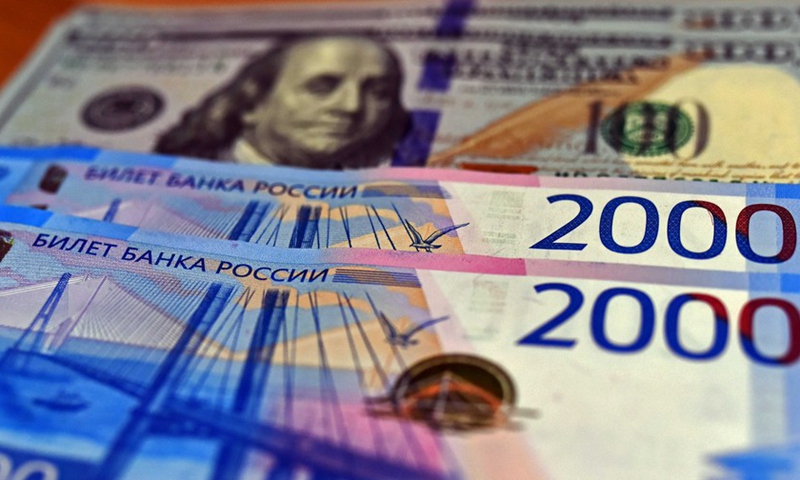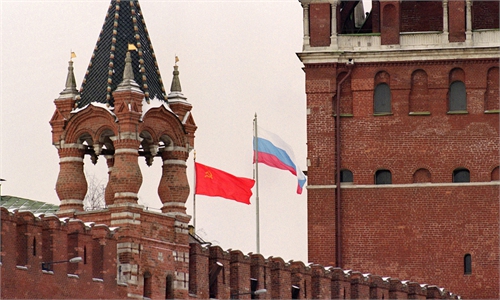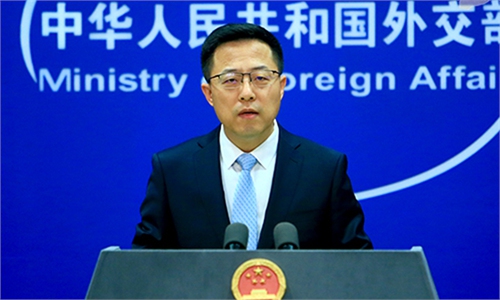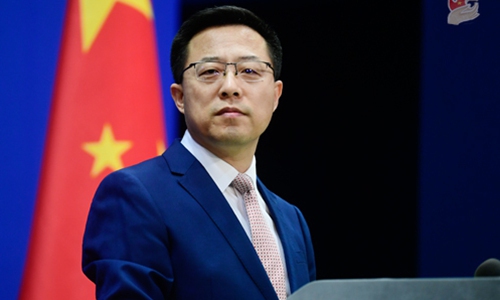
Russian ruble banknotes are seen with the U.S. dollars in the backdrop on March 2, 2021.(Photo: Xinhua)
Russia will likely continue to add the Chinese yuan to its foreign exchange reserves, while slashing the US dollar over the medium and long term, as it increasingly looks eastward for economic development amid stringent Western financial sanctions, especially following the Russia-Ukraine conflict, analysts said on Tuesday.The comment came after data from the Bank of Russia showed on Monday that Russia's yuan holdings as a percentage of total reserves jumped from 12.8 percent to 17.1 percent as of January 1, while its holdings of the US currency halved to 10.9 percent from 21.1 percent a year earlier, Chinese news website jiemian.com reported.
During the same period, which preceded the Russia-Ukraine conflict that started in February, Russia's euro holdings increased slightly from 29.2 percent to 33.9 percent, and its gold holdings decreased slightly to 21.5 percent, according to the report.
The Russian central bank's move reflects the falling credibility of the US dollar, as the US has been weaponizing the dollar as a financial weapon instead of a trusted international payment currency, Xu Wenhong, a research fellow at the Institute of Russian, East European and Central Asian Studies under the Chinese Academy of Social Sciences, told the Global Times on Tuesday.
Following Russia's military actions in Ukraine in February, the US-led West has imposed more than 5,515 sanctions on Russia, mainly targeting the country's financial sector, including removing several key banks from the SWIFT system, freezing more than $300 billion of the Russian central bank's reserves, and prohibiting access of the Russian financial institutions to transactions in US dollars.
Given the renewed sanctions, "Russia will undoubtedly continuously increase holdings of yuan in the medium to long term, as the country prefers to adopt local currencies as settlement for expanding bilateral trade against the backdrop of stringent financial sanctions from the West," Dong Dengxin, director of the Finance and Securities Institute at the Wuhan University of Science and Technology, told the Global Times on Tuesday.
Along with the growing internationalization of the yuan, many Western countries have also adopted the yuan as reserves, Dong said, noting that yuan is a desirable alternative to the US dollar.
The total volume of yuan in global reserves climbed to $336.1 billion in the fourth quarter of 2021, hitting a record high of 2.79 percent in global reserves and ranking fifth among global currencies, according to Currency Composition of Official Foreign Exchange Reserves data released by the IMF in March.
As part of a package to reduce dependence on the US dollar, Russia has been enhancing its efforts in de-dollarization since 2014 and slashed most of its holdings of US debts in 2018 spring, Xu said.
"Unprecedented and all-round sanctions from the US-led West force Russia to seek economic growth by looking eastward to the Asia-Pacific regions," Xu said, noting that the increase of yuan holdings in Russian foreign exchange reserves also reflects the massive potential of China-Russia bilateral trade as well as its confidence in China's economic prospect.
China-Russia bilateral trade volume in 2021 grew by 35.9 percent year-on-year, reaching $146.8 billion, exceeding the $140 million mark for the first time, a record high, official data showed. China has been Russia's largest trading partner for 12 consecutive years.
Following sanctions imposed on Russian by the West in February, the first shipments of Russian coal and oil paid for in the Chinese currency will be delivered to independent Chinese refiners in May, as Russian sellers give buyers in China the flexibility to pay in yuan, Bloomberg reported on Thursday, citing people familiar with the purchase.
The Chinese Foreign Ministry has repeatedly expressed Western sanctions against Russia and said that China will continue to carry out normal trade cooperation with Russia.



